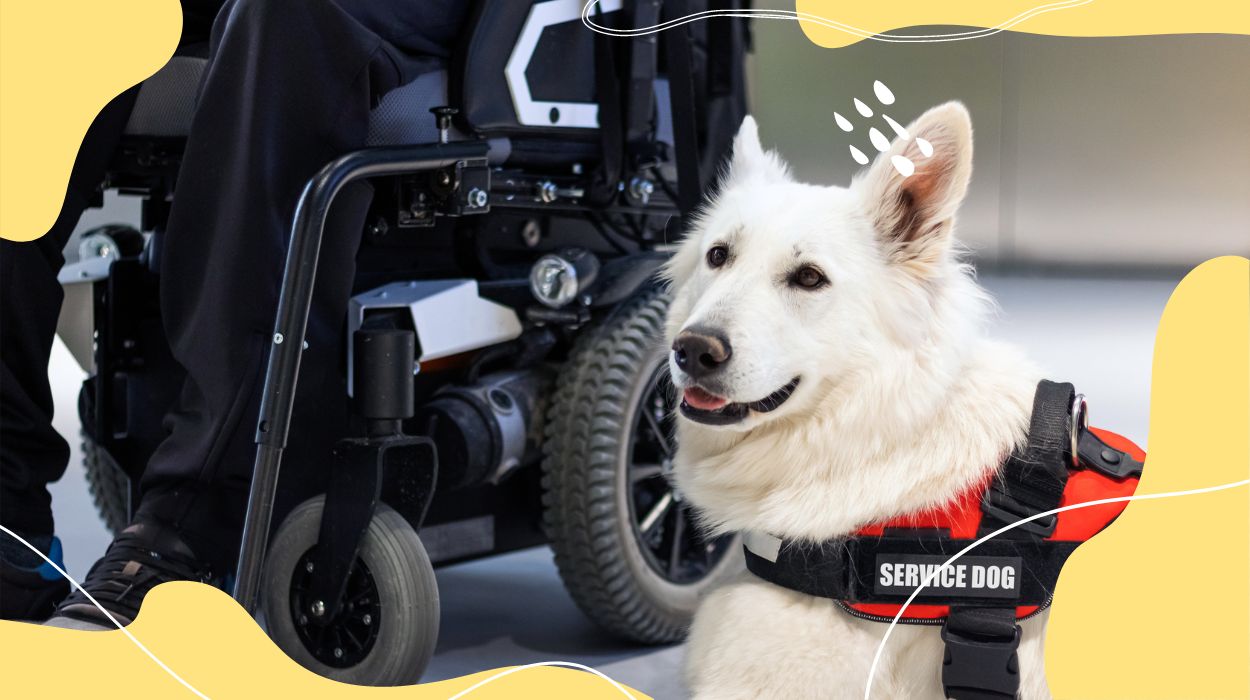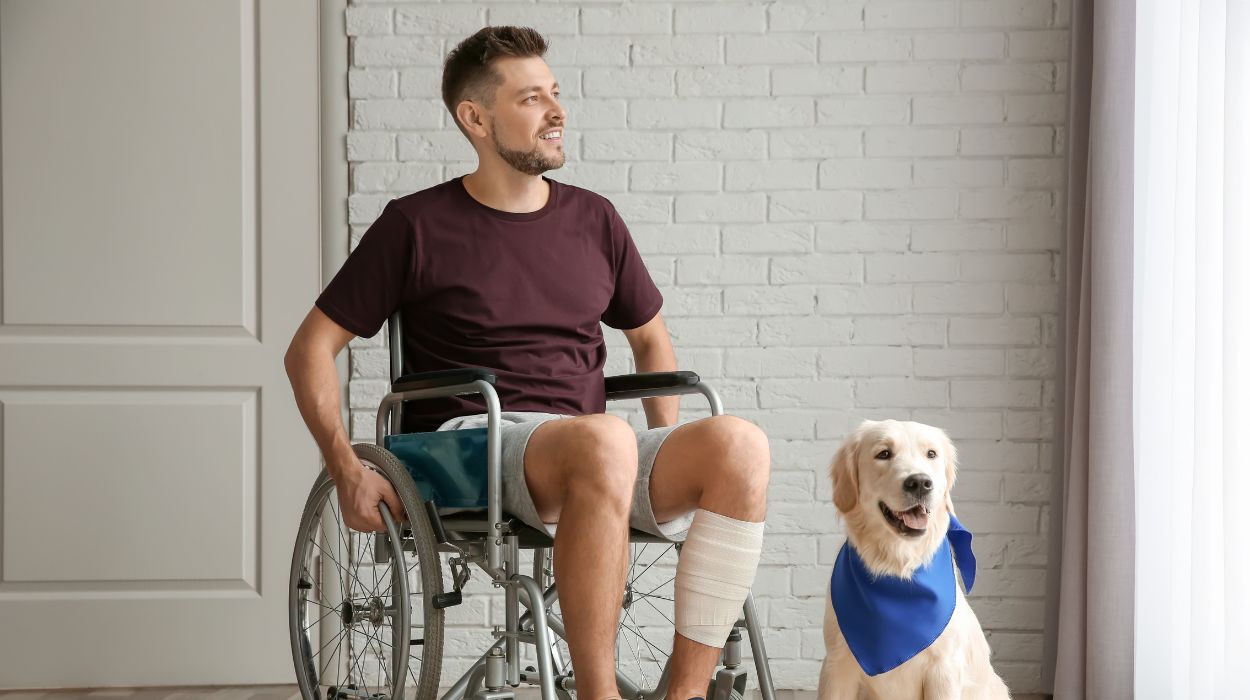 Expert's opinion
Expert's opinion
Expert's opinion
The article is a subjective view on this topic written by writers specializing in medical writing.
It may reflect on a personal journey surrounding struggles with an illness or medical condition, involve product comparisons, diet considerations, or other health-related opinions.
Although the view is entirely that of the writer, it is based on academic experiences and scientific research they have conducted; it is fact-checked by a team of degreed medical experts, and validated by sources attached to the article.
The numbers in parenthesis (1,2,3) will take you to clickable links to related scientific papers.
Psychiatric Service Dog 2024: How To Get A Psychiatric Service Dog Letter?
All articles are produced independently. When you click our links for purchasing products, we earn an affiliate commission. Learn more about how we earn revenue by reading our advertise disclaimer.

Assistance dogs, also known as service dogs, are dogs trained to assist an individual with a disability. These dogs can be trained to assist with a wide variety of disabilities, both physical and mental, and they are protected by federal laws and regulations under the Americans with Disabilities Act (ADA). Here is what you need to know about psychiatric service dogs including what they are, how to qualify for one, and how they differ from other service animals.
What Is A Psychiatric Service Dog?
The Americans with Disabilities Act (ADA) defines a service dog[1] as a dog that is “individually trained to do work or perform tasks for people with disabilities.” Each individual service dog is trained to perform specific tasks for a specific handler.
For example, guide dogs are trained to work with people who are blind, and hearing dogs are trained for hearing-impaired individuals. These dogs might be trained to locate objects, help the handler board public transportation, and alert the individual to curbs and steps.
A psychiatric service dog is a specific type of service dog trained to assist individuals with mental or psychiatric disabilities. Also known as psychiatric assistance dogs (PAD), these dogs can be useful for individuals diagnosed with[2] mental illnesses such as post-traumatic stress disorder (PTSD), schizophrenia, depression, anxiety, bipolar disorder, and more.
Psychiatric service dogs may be trained to perform tasks such as:
- Waking the handler up
- Providing tactile stimulation
- Facilitating social interactions
- Acting as a buffer in crowds
- Grounding a person with anxiety
- Fetching medication and water
- Helping create a safe personal space
- Seeking help when needed
- Providing balance assistance
- Disrupting emotional overload
In addition to performing these specific tasks, psychiatric service animals provide companionship. In some ways, the tasks of a psychiatric assistance dog overlap with those of emotional support dogs. These dogs can give the handler a reason to get out of bed in the morning in addition to providing emotional support and helping create a routine.
How To Qualify For A PSD Letter?
If you suffer from a mental disability and think you might qualify for a psychiatric service animal, you will need to get a letter from a medical doctor to verify your psychiatric disability. A licensed mental health professional will need to write you a recommendation for a specially trained service dog to help you with a specific mental health condition.
When it comes to obtaining a psychiatric service dog, there are a number of options. The ADA does not require[3] service dogs to be trained by a professional trainer – individuals with mental impairment have the right to train the dog themselves. Because this can be a lot of work, however, many individuals obtain a fully trained dog from a service dog training organization.
Before you take steps to obtain a PSD letter, make sure you are going through the proper channels. There is no such thing as service dog registration, so do not fall victim to scams on the internet offering fake certification for service dogs. A psychiatric service dog performs particular tasks catering to the owner’s disability – not every dog can become a service dog.
Can An ESA Turn Into A Psychiatric Service Dog?
If you already have an emotional support animal but you need more assistance, you may be able to turn your ESA into a service animal. Again, a service animal is specially trained to assist individuals with mental health issues so, as long as your dog goes through the proper training and you have a letter from your mental health professional, your ESA can legally become a service animal.
Train An ESA Into A PSD
Because the ADA does not require service dogs to be professionally trained, you may be able to train the dog yourself. Keep in mind, however, that there are specific requirements for service dogs, so you may want to enlist the help of a professional dog trainer anyway, or at least obtain legal advice to make sure your dog meets the requirements.
In order to become a service dog, an emotional support dog must be trained in performing tasks specific to the person’s disability. The dog must be well-mannered in public at all times and must pass a public access test. If it is not obvious what services the dog provides (as may be the case for invisible disabilities), the handler must also be willing to answer two questions about the dog.
The Difference Between Service Animals

While it is easy to understand the specific role a guide dog plays in the assistance of a visually impaired person, it is a little trickier to tell the difference between assistance dogs that provide emotional support. Therapy dogs, emotional support animals (ESAs), and psychiatric service dogs fill some overlapping roles but each has a specific purpose.
A therapy dog is a pet that has been trained to provide comfort in hospitals, nursing homes, and schools. These dogs are typically trained by a therapy dog organization, often by volunteers, and they are not protected by the same ADA rights as service dogs.
An emotional support animal also provides comfort, but they are not necessarily trained for any specific task. These are pets that comfort their owners with their presence. While emotional support animals do have some legal protections under federal law in terms of housing and air travel, they do not have the same public access rights as psychiatric service dogs.
While only dogs can be service animals, emotional support animals may include other animals like cats, ferrets, mini pigs, and birds – anything that can be manageable in public.
Here is what the ADA has to say about emotional support animals:
These support animals provide companionship, relieve loneliness, and sometimes help with severe depression, anxiety, and certain phobias, but do not have special training to perform tasks that assist people with disabilities.
Psychiatric service dogs are trained to perform services that assist individuals with mental illness or psychiatric disabilities. They are trained to detect the onset of a psychiatric episode (like panic attacks) and to act in such a way as to lessen its effects. These service dogs might remind their handler to take medicine, perform a room search for individuals with post-traumatic stress disorder, or interrupt self-mutilation. They also provide comfort and companionship.
What Services Do Psychiatric Service Dogs Provide?
Unlike emotional support animals, psychiatric service dogs are trained for certain tasks and they are trained to work with a specific individual. These tasks either help the individual do things they cannot do for themselves or minimize the negative effects of the individual’s disability.
Here are some of the services psychiatric service dogs provide:
- Guiding a disoriented handler – During a dissociative episode, the handler might wander away from familiar surroundings. When they come to, they may be disoriented – the service dog can help by following the original scent trail to lead the handler back to where the episode began.
- Finding a person or place – When the handler becomes separated from friends or family in a crowd, they can give the dog a signal to locate the family or seek help. This is particularly useful during panic attacks when the individual may not be able to call out on their own.
- Perform a room search – For individuals with hypervigilance (often due to PTSD), the dog can perform a room search before the individual enters the home. The dog can be trained to perform a systematic search of each room and bark if they find someone.
- Interrupt self-harm behaviors – Individuals who exhibit self-harm behaviors can benefit from a service dog trained to recognize the behavior and interrupt it. For example, the dog might bring the handler a brush to replace the self-harm behavior with grooming, a non-harmful alternative.
- Seek and bring help – In an emergency situation, a service dog can recognize the need for assistance and go find it. Service dogs can also be trained to fetch medication in an emergency and bring it to the handler.
- Identify hallucinations – Individuals who experience hallucinations cannot always tell if what they see is real. A service dog can be trained to greet a person the handler points at – if the handler points at a hallucination and the dog does not see the person, he will return to the handler and they will know it is a hallucination.
Do Service Dogs Make A Difference?
For individuals with physical disabilities, the benefits service dogs provide are obvious. For an invisible disability like mental illness, however, the benefits may be more subtle. Every situation is different because service dogs are trained to work with a specific handler, but there is a significant amount of research that shows the benefits service dogs provide.
For example, a 2009 survey evaluating the effectiveness of psychiatric service dogs for the treatment of PTSD showed that 82% of individuals who partnered with a service dog reported a reduction in symptoms. Additionally, 40% of those surveyed took less medication.
In a 2019 literature review[2] published in the journal Frontiers in Veterinary Science, having a psychiatric assistance dog decreased the usage of psychiatric or other healthcare services in 46% of participants. Decreased usage of these services was attributed to reduced suicide attempts and less requirement for medication and hospitalization. In cases where usage of these services increased, it was mainly due to an enhanced ability to attend appointments. Every participant described their relationship with their service dog as positive.
In a 2020 article[4] published in the journal Frontiers in Psychology, researchers evaluated the usage and effectiveness of psychiatric service dogs for military veterans with PTSD. Participants reported using a trained task an average of 3.16 times per day with the most important task being calming or comforting anxiety. Interestingly, the majority of veterans polled rated the importance of their assistance dog’s untrained task higher than trained tasks. Many reported the most important untrained behavior was giving the veteran something to love and something to feel loved by in return.
Lawsuit For Psychiatric Service Dog Access
Psychiatric service dogs are trained to perform tasks catered to their handler’s disability and they are protected by federal law for certain things.
For example, service animals are given broad public access rights even in places where pets are not allowed such as restaurants, grocery stores, and government buildings. A service animal can fly in the cabin of a USA-based commercial airline without being charged a pet fee. Landlords and property managers are also prohibited from charging pet fees for tenants with service dogs.
Final Thought
Like all assistance dogs, psychiatric service dogs fulfill a specific purpose for their handler. These dogs are trained to perform certain tasks that the handler cannot perform on their own or that help lessen the negative effects of their mental illness. Having a service dog can help the handler maintain some sense of normalcy and independence in their life.
If you are considering applying for a service dog, talk to your mental health professional about the options. If your mental illness doesn’t create a substantial disability in your life, you may not meet the requirements for a service dog but might still benefit from having an emotional support animal. In either case, your doctor can help you weigh the options and determine whether you meet the requirements. You will need a letter from your doctor in either case as well.
Frequently Asked Questions
In order to qualify for a psychiatric service dog, you must have a psychiatric disability. Examples include anxiety, depression, post-traumatic stress disorder (PTSD), bipolar disorder, schizophrenia, and more.
Training a service dog can take upwards of 120 hours over the course of about 6 months. If you are training the dog yourself, it could take as long as 2 years.
Service dogs are trained to perform certain tasks specific to the person’s disability. Some tasks they might perform include guiding a disoriented person, interrupting self-harm behaviors, performing room searches, seeking help, and reminding the individual to take their medication.
Yes, psychiatric service dogs are protected under federal law and are allowed public access even in places where pets are not. This includes housing, government buildings, grocery stores, malls, theaters, and more.
Individuals with mental illnesses may qualify for a service dog if their illness substantially limits their well-being and/or ability to function. You will need a recommendation from a licensed mental health professional stating this need.
The ADA specifies that only dogs can be service animals, though there are no requirements for the breed. Some of the best psychiatric service dog breeds include golden retrievers, Labrador retrievers, and German shepherds because they are trainable and have calm temperaments.
+ 4 sources
Health Canal avoids using tertiary references. We have strict sourcing guidelines and rely on peer-reviewed studies, academic researches from medical associations and institutions. To ensure the accuracy of articles in Health Canal, you can read more about the editorial process here
- ADA.gov. (2023). ADA Requirements: Service Animals. [online] Available at: https://www.ada.gov/resources/service-animals-2010-requirements/ [Accessed 11 Jul. 2023].
- Lloyd, J., Johnston, L. and Lewis, J.B. (2019). Psychiatric Assistance Dog Use for People Living With Mental Health Disorders. [online] 6. doi:https://doi.org/10.3389/fvets.2019.00166.
- ADA.gov. (2023). Frequently Asked Questions about Service Animals and the ADA. [online] Available at: https://www.ada.gov/resources/service-animals-faqs/ [Accessed 11 Jul. 2023].
- Rodriguez, K.E., LaFollette, M.R., Hediger, K., Ogata, N. and O’Haire, M.E. (2020). Defining the PTSD Service Dog Intervention: Perceived Importance, Usage, and Symptom Specificity of Psychiatric Service Dogs for Military Veterans. [online] 11. doi:https://doi.org/10.3389/fpsyg.2020.01638.



